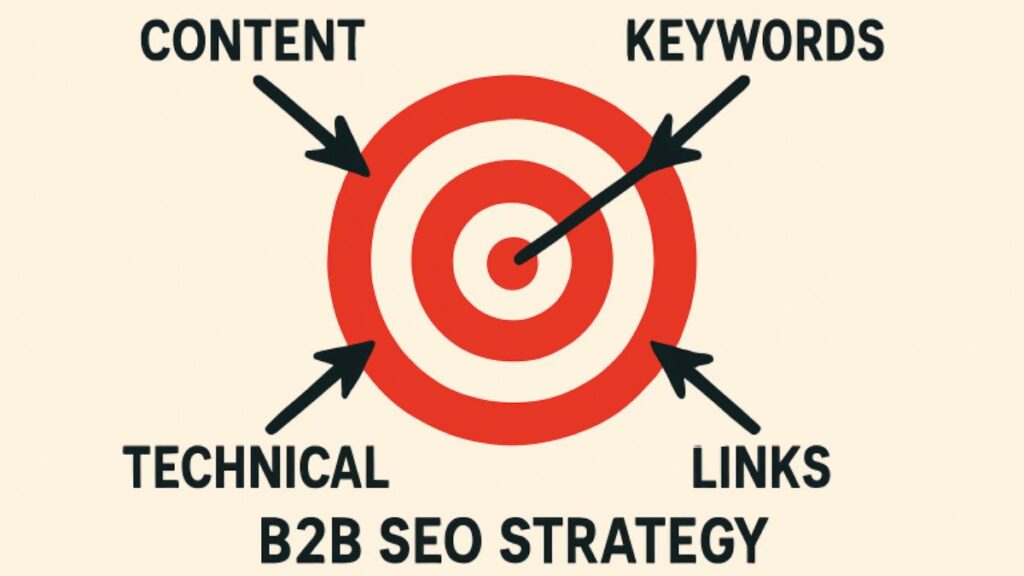The Unique Challenges of B2B SEO
B2B SEO presents a unique set of challenges compared to traditional consumer-focused strategies. Unlike B2C, where emotions and quick conversions often drive purchasing decisions, B2B sales cycles are longer, more complex, and involve multiple decision-makers. This requires content that attracts, educates, and nurtures potential clients over time. Additionally, keyword research is more intricate, as search volumes are typically lower and the terms are specific to niche industries, making visibility harder to achieve.
To succeed in this environment, businesses must balance technical SEO with content strategies that demonstrate authority, trust, and value. Partnering with a B2B SEO agency can provide tailored expertise, ensuring efforts are aligned with industry-specific demands and decision-making processes. Such agencies help optimize everything from keyword targeting to conversion-focused landing pages, bridging the gap between search visibility and meaningful business outcomes. With the right approach, B2B SEO becomes a powerful long-term growth driver.
Understanding the B2B Audience
An in-depth understanding of the target audience is at the heart of every successful B2B SEO campaign. Business buyers are motivated by specific operational goals and pain points and expect practical solutions rooted in expertise. B2B e-commerce sales in the United States are set to exceed $3 trillion by 2027, reflecting high stakes and intense competition. By mapping out who makes purchasing decisions, what drives their research, and how they evaluate providers, brands can tailor keyword choices, content direction, and calls to action to directly address buyer demands.
Defining buyer personas and understanding each stage of the decision-making journey helps ensure that all digital touchpoints—from blog content to downloadable assets—work together to build meaningful engagement and drive leads.
Effective Keyword Research for B2B
In B2B SEO, keyword research requires a highly refined approach. While broad search terms may seem appealing, real value lies in long-tail queries and intent-driven phrases that indicate active research or purchasing readiness. For example, phrases such as “ERP software for healthcare providers” target an audience deep in the decision process, minimizing irrelevant clicks. Analyzing competitor sites, leveraging industry-specific language, and reviewing historical search trends with keyword tools are critical.
- Focus on keywords that reflect a clear business intent.
- Monitor industry forums and discussions to capture emerging trends.
- Revisit and update target keywords as industry lingo shifts.
Content Strategies That Build Authority
Decision-makers are looking for depth and trustworthiness when evaluating potential solutions. Authoritative content can set your brand apart in saturated markets. Case studies, comprehensive guides, original research, and whitepapers are compelling for nurturing leads through long sales cycles. Recent research shows that 73% of B2B marketers rank case studies among the most effective tools for lead generation. Interactive calculators, webinars, and tools can further engage prospects and help build the authority to close deals.
To truly resonate, content should address specific questions, provide actionable insights, and continually reaffirm your brand’s expertise—positioning your company as a trusted industry advisor.
On-Page and Technical Optimization
High-quality content must be matched by flawless technical performance. Visitors (and search engines) expect seamless experiences—fast-loading pages, mobile optimization, and intuitive navigation. Properly structured data and schema markup can boost visibility in search engine results, particularly for featured snippets and industry-specific queries. Thorough technical audits ensure crawlability, eliminate duplicate content, fix broken links, and address accessibility guidelines.
- Implement a schema to highlight key products and frequently asked questions.
- Make all resources easily accessible and downloadable for busy professionals.
- Adhere to web accessibility standards for broader reach and compliance.
Optimized metadata, logical internal linking, and regular site maintenance reinforce trust with users and search engines, driving sustained growth.
Approaching Link Building in B2B Spaces
In B2B sectors, a handful of high-quality, relevant backlinks can wield more influence than dozens of low-value links. Earning mentions from respected trade publications, industry associations, and authoritative blogs is worth far more than broad, unfocused link building. Strategies such as guest posting, sharing proprietary research, and launching digital PR campaigns with a sector focus can yield strong results and drive referral traffic and domain authority. Building relationships within your niche helps secure valuable backlinks and keeps your brand at the forefront of industry influencers’ minds.
Data-driven outreach and participation in expert roundups are proven methods for continuing to build authority and presence in your business community.
Measuring Success and Pivoting Tactics
Success in B2B SEO is best measured by impact, not just volume. Key metrics include qualified leads, conversion rates, page dwell time, and engagement with key assets such as downloadable case studies or whitepapers. Integrating insights from platforms like Google Analytics and CRM tools sheds light on which tactics yield results and which require refinement. Compare against industry benchmarks and be ready to recalibrate strategy if KPIs aren’t meeting goals.
Ongoing review and adaptation are essential—what works today may need updating tomorrow due to shifts in buyer behavior or emerging technology.
Emerging Trends in B2B SEO
The B2B SEO landscape is rapidly evolving. Technologies like AI-driven personalization, voice search, and increasingly complex zero-click results are significantly impacting it. Machine learning tools can analyze patterns in buyer behavior and inform content strategies more effectively than ever. Regularly reviewing trusted industry news from sources like Search Engine Land ensures marketers remain agile, ready to adopt innovations in real time, and maintain a competitive edge.
Those who stay ahead of these trends—experimenting with new technology, voice content, or AI-generated insights—can better position their business for visibility and growth.
Conclusion
Building a winning B2B SEO program means embracing the complexity of business purchasing cycles and targeting high-value decision-makers at every digital touchpoint. Integrating thoughtful keyword research, value-driven content, and rock-solid technical optimization ensures brands appear when and where business buyers look. Measuring success by quality rather than quantity and staying open to emerging trends positions organizations for sustainable results. Those who consistently prioritize user-focused strategies will set the standard for effective B2B digital marketing in an ever-changing digital world.






